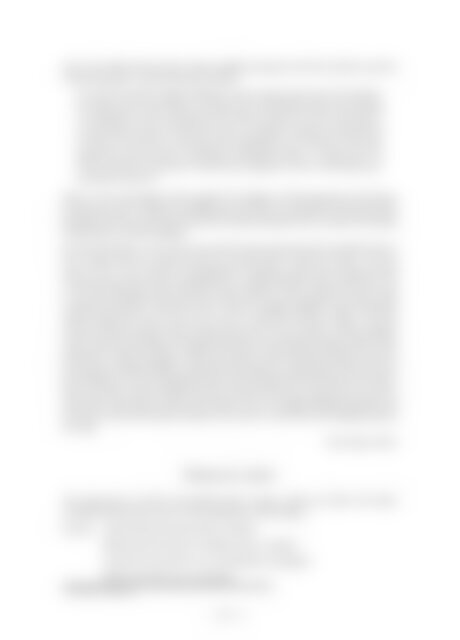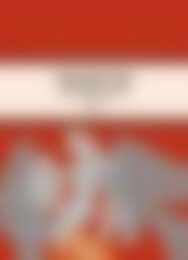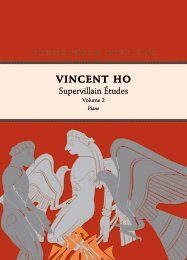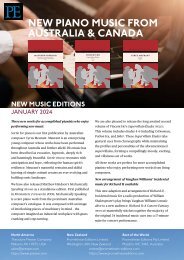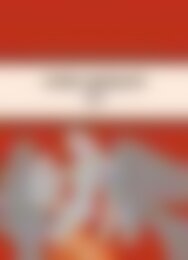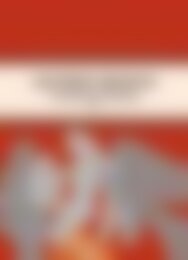Incidental music to Electra (Preview)
by Ralph Vaughan Williams | Orchestra and chorus
by Ralph Vaughan Williams | Orchestra and chorus
Create successful ePaper yourself
Turn your PDF publications into a flip-book with our unique Google optimized e-Paper software.
1912. In its 25 May Musical Gossip column, English newspaper The Globe included a preview<br />
of the performance, with the prescient remarks:<br />
In connection with Mr Vaughan Williams’ <strong>music</strong>al setting of choruses from Euripides,<br />
<strong>to</strong> be given at the Court Theatre next Friday, we are informed that “they are an attempt<br />
at something new, and something which is neither German nor French. This <strong>music</strong> is<br />
no experiment in style. It would seem, rather, as though the composer had disclaimed<br />
all styles and all schools, and found direct inspiration in the material of the poet’s<br />
inspiration, and the result is something of undeniable beauty.” A chorus from ‘The<br />
<strong>Electra</strong>’ and from ‘The Bacchae’ and four from ‘Iphigenia in Tauris’ should make up a<br />
programme of interest. 7<br />
<strong>Electra</strong> is the central figure of this tragedy. The daughter of King Agamemnon and Queen<br />
Clytemnestra, she is shattered in childhood by the shock of an experience <strong>to</strong>o hard <strong>to</strong> bear,<br />
growing <strong>to</strong> become a poisoned and haunted woman eating her heart in ceaseless broodings<br />
of hate and love, alike unsatisfied.<br />
How does the his<strong>to</strong>ry set out above tally with the manuscripts found in the British Library?<br />
Let us begin with two choruses from the second section. The first of these, O for the<br />
ships, is set in ‘a sort of chant’ accompanied by a dominant pedal on the strings and with<br />
occasional interjections from woodwinds, horn, cymbals and harp. The second, There came<br />
a man, has thrumming string and harp chords with the voices doubled in mostly single<br />
woodwind instruments. This chorus has a <strong>to</strong>uch of Vaughan Williams’ superb archetypal<br />
melody against the words “How, orb on orb, <strong>to</strong> strike with cold the Trojan”. The first<br />
section, for <strong>Electra</strong> herself, Onward O labouring tread, is set as recitative, with the addition<br />
of pure speech occasionally. The singing and much of the speaking is against chords, often<br />
dissonant <strong>to</strong> reflect the subject matter, and with the small orchestra setting the mood of<br />
each section. Vaughan Williams’ treatment of dissonance is a premonition of his use of it in<br />
the symphonies <strong>to</strong> come, although the <strong>music</strong> is less elaborate than his <strong>music</strong> for The Wasps.<br />
Here, he mostly concerns himself with the vocal line and how it carries the text in such a<br />
natural flow. The chorus is made up of women’s voices. As Vaughan Williams specified, ‘the<br />
solos may be divided among the members of the chorus’, after <strong>Electra</strong> has disappeared from<br />
the stage.<br />
Alan Tongue, Edi<strong>to</strong>r<br />
Edi<strong>to</strong>rial notes<br />
The manuscripts are held in the British Library Archives within two folios. The edi<strong>to</strong>r<br />
arranged them in<strong>to</strong> four sources in the preparation of this edition.<br />
Sources:<br />
A MS 71480 Instrumental parts, complete<br />
7 The Globe, 25 May 1912.<br />
B MS 71480 Chorus parts, mulitple copies, complete<br />
C MS 71479 Vocal short scores and sketches, incomplete<br />
D MS 71479 Full scores, incomplete<br />
PEV03 – vii


